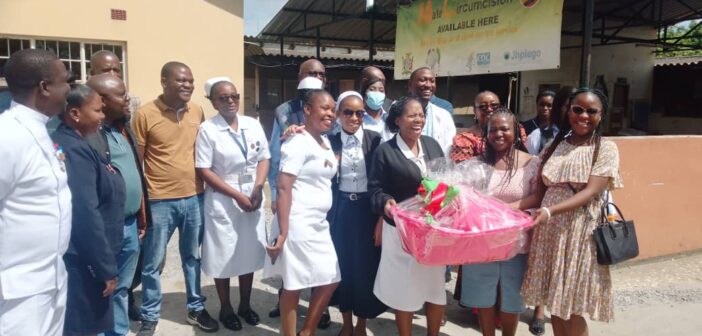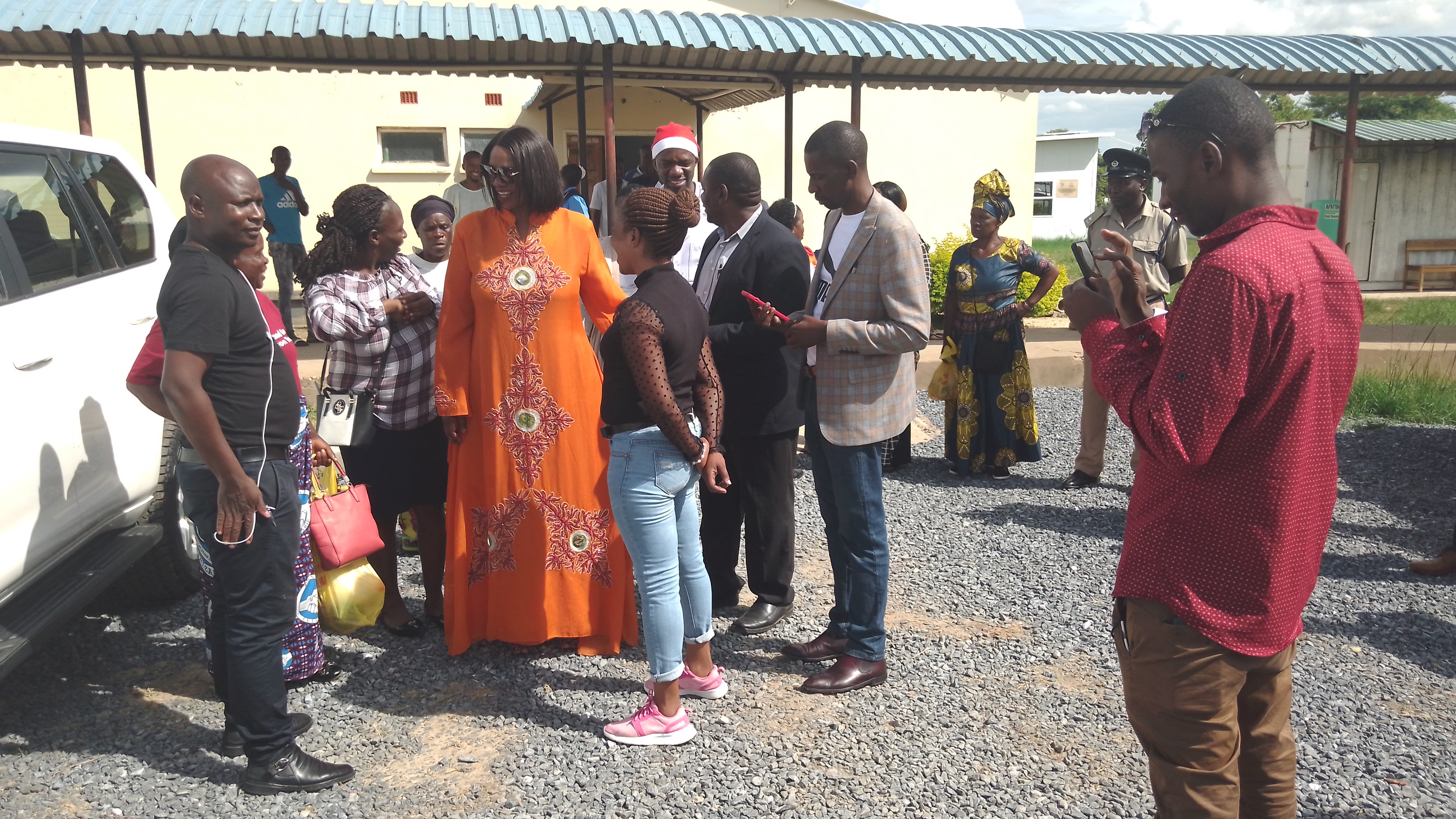
Health Minister Sylvia Tembo-Masebo in Chongwe District Lusaka on Christmas 🌲 Sunday, 25th December, 2022 – picture by Kwilanzi Newspaper Zambia (KNZ)
“A smile will motivate, mothers to return after a worthwhile delivery experience,” MoH PS TS Professor Lackson Kasonka prods Zambian midwives
By Saeed Simon Banda, Henry Chunza, Derrick Sinjela and Ashton Kelly Bunda
Ministry of Health (MoH) Permanent Secretary for Technical Services (PS-TS) Professor Lackson Kasonka believes that welcoming atmosphere by midwives will motivate, mothers to return after a worthwhile first, second or third delivery experience.
Speaking after presenting Christmas 🌲 Baby hampers on behalf of First Lady Mutinta Hichilema, at Chilenje Level 1 Hospital, Kabwata Constituency and Bauleni Clinic, Lusaka Central Constituency in Lusaka, Professor Kasonka prodded Zambian midwives to always render candid service to expectant mothers.
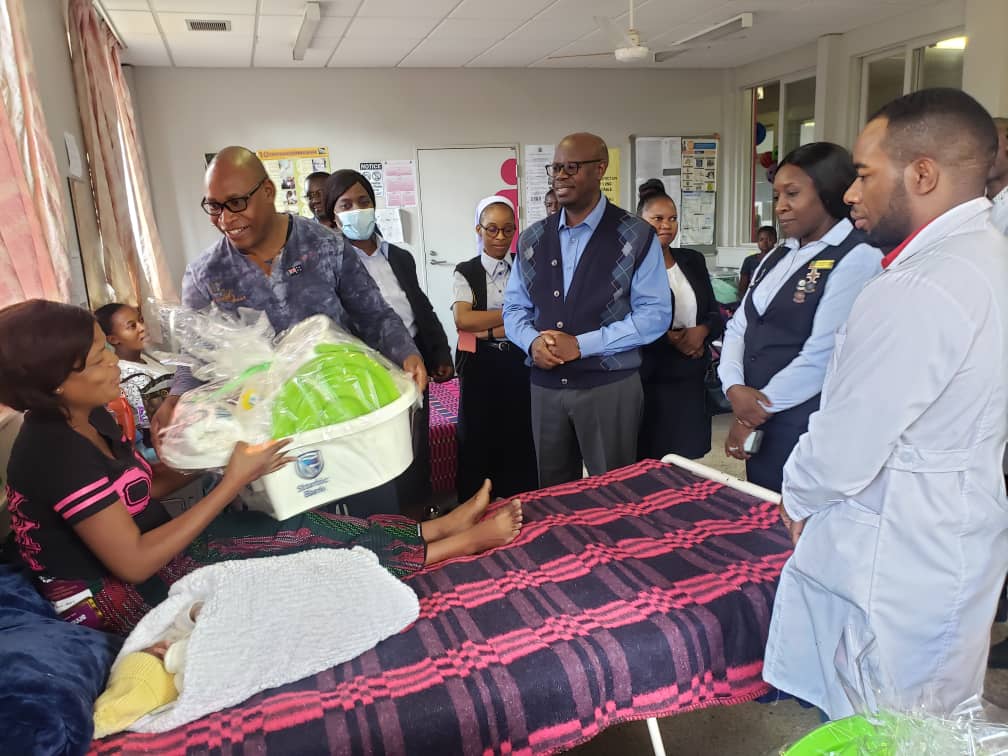
Andrew Tayengwa and Professor Lackson Kasonka at Chilenje Level 1 Hospital
Earlier, after presenting hampers to mother’s at Chilenje Level 1 Hospital, Professor Kasonka and United Party for National Development (UPND) Kabwata Constituency Member of Parliament (MP) Andrew Tayengwa expressed delight at the noted clean and neat surroundings.
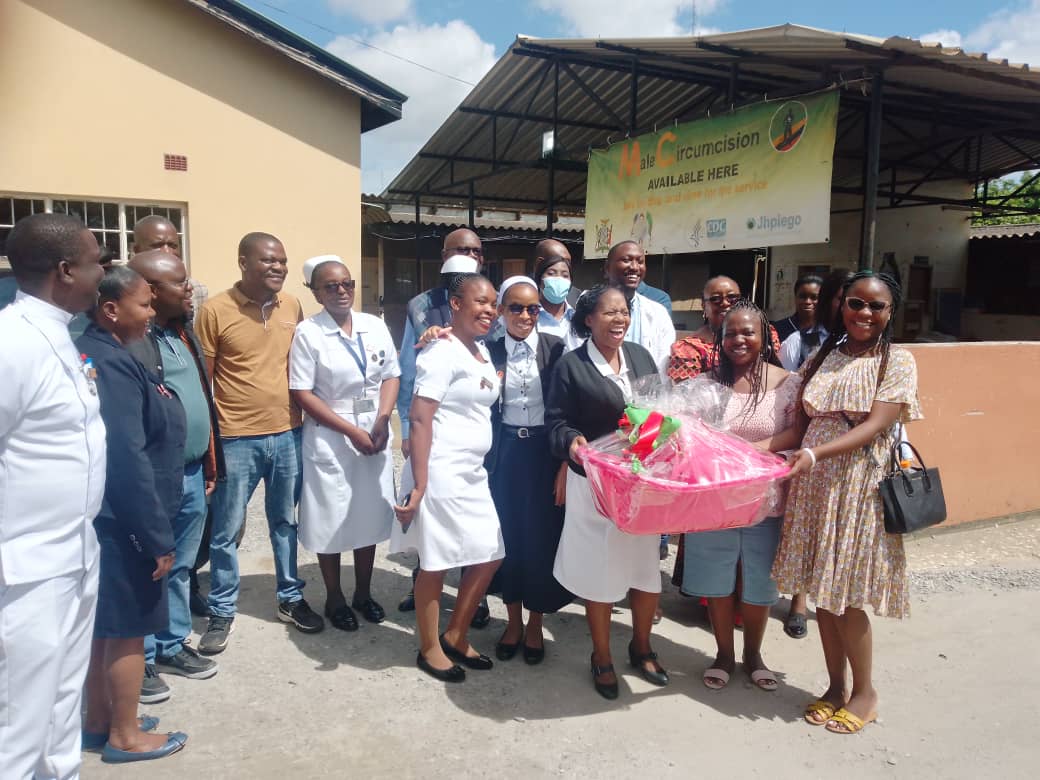
Professor Lackson Kasonka after a baby hampers presentation at Bauleni Clinic in Lusaka – Picture by Kwilanzi Newspaper Zambia (KNZ)
Upon realising the low birth figures, and Central Statistical Agency (CSA) population figures of the 2022 Census indicating a one (1) million rise from 18 to 19,610,769 people that were counted, 10,007,713 were female while 9,603,056 were male, Professor Kasonka lamented failure to grow Zambia’s population.
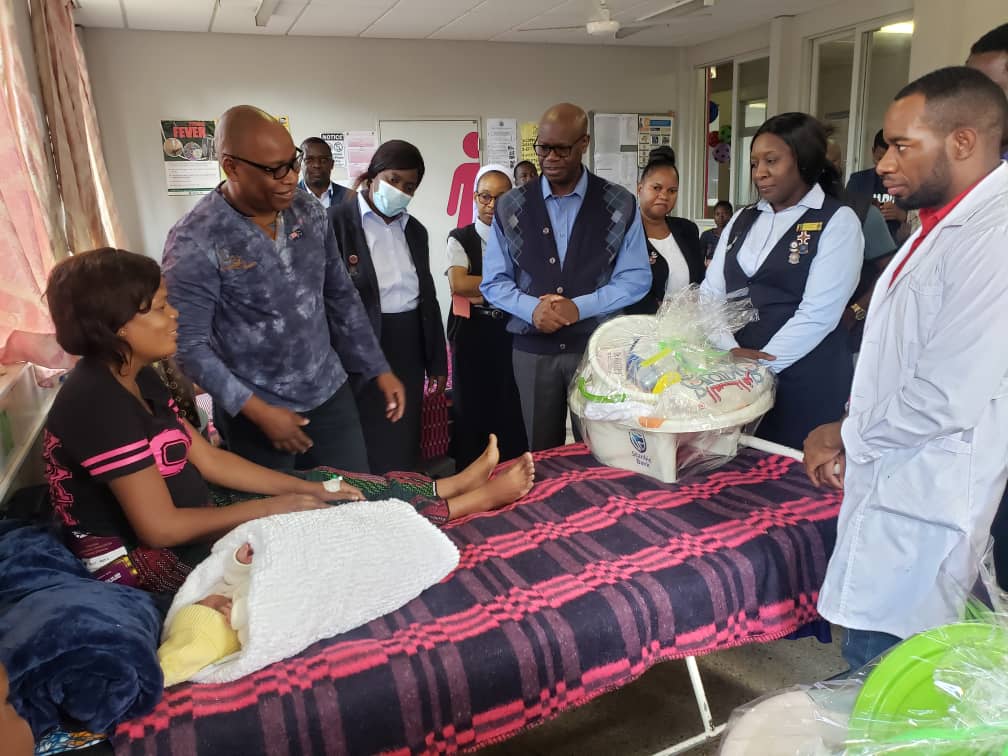
Kabwata Constituency Member of Parliament MP Andrew Tayengwa and MoH Permanent Secretary Technical Services (PS-TS) Professor Lackson Kasonka at Chilenje Level 1 Hospital in LUSAKA
Meanwhile, Health Minister, Sylvia Tembo-Masebo was in Chongwe District of Lusaka Province to give baby hampers to mother’s at Chongwe District Hospital.
Ms. Tembo-Masebo, equally encouraged patients to keep healthy lifestyles once on medication and upon recuperating.
Ms. Tembo-Masebo took time offering counsel to a couple of patients hospitalized as a consequence of alcoholism, as she lamented that Chongwe District continues being a haven of drinking sprees among young people and adults.
“I do not know what has to be done to discourage young people and everyone else from beer drinking? It is so sad that everyone wants to invest in a bar and consumption of alcohol is becoming a norm rather than an exception,” Ms. Tembo-Masebo wondered within earshot of a Zambian Developmental Media Alliance (ZADEMA) and Zambian Children Young People and Women in Development (ZCYPWD) crew that included The Bundas Incorporated Blog Sport.

DERRICK SINJELA and Ashton Kelly Bunda
The 2022 census of Zambia was a detailed enumeration of the Zambian population that became the sixth national census in the country since independence. It began on August 18, 2022 and concluded by September 14, 2022.[1]It became Zambia’s first-ever digitally conducted population census.[2]
2022 Census of Zambia
← 2010
August 18, 2022 – September 14, 2022
2032 →
General information
Country
Zambia
Topics
Census topics
People and population
Families and living arrangements
Nationality
Education
Economic Characteristics
Authority
Zambia Statistics Agency (ZamStats)
Website
www
Background
The Zambia Statistics Agency is mandated to conduct the Census of Population and Housing (CPH) every 10 years as per Statistics Act No. 13 of 2018. The Census was supposed to be conducted in 2020 but was postponed to November 2021 due to funding challenges. In November 2021, the census failed to take place due to delays in procurement of materials needed for the census.[3] The 2022 census became the sixth conducted in independent Zambia; the first was conducted in 1969 and thereafter, 1980, 1990, 2000 and 2010.[4]
Administration
Zambia Statistics Agency conducted the sixth census of population and Housing. The enumeration and data collecting exercise was carried out from 18 August to 14 September 2022 by 45,000[5] enumerators including supervisors (especially school leavers and qualified youths).
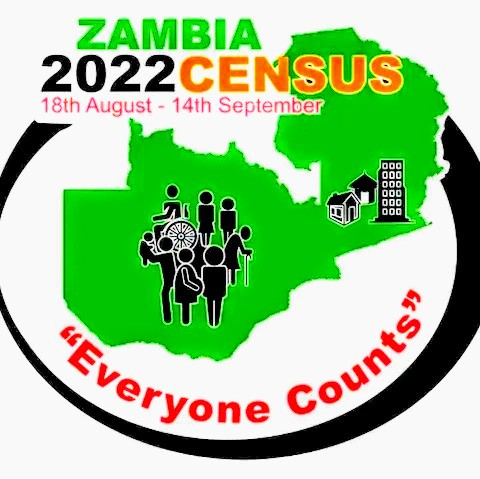
Zambia Census 2022
Zambia’s population rises to 19.6 mln, census finds
Source: Xinhua
Editor: huaxia
2022-12-24 18:20:32

People take part in a cleaning activity on Kaunda Day in Lusaka, Zambia, on April 28, 2022. (Photo by Martin Mbangweta/Xinhua)
Zambia on Friday announced the results of its first-ever electronic national census, which indicated the country’s population stood at 19.6 million, up from 13.1 million in 2010.
LUSAKA, Dec. 24 (Xinhua) — Zambia on Friday announced the results of its first-ever electronic national census, which indicated the country’s population stood at 19.6 million, up from 13.1 million in 2010.
The sixth census of population and housing was conducted between Aug. 18 and Sept. 14, 2022.
According to preliminary results announced by the Zambia Statistics Agency, out of the 19,610,769 people that were counted, 10,007,713 were female while 9,603,056 were male.
The annual population growth rate rose from 2.8 percent between 2000 and 2010 to 3.4 percent between 2010 and 2022.
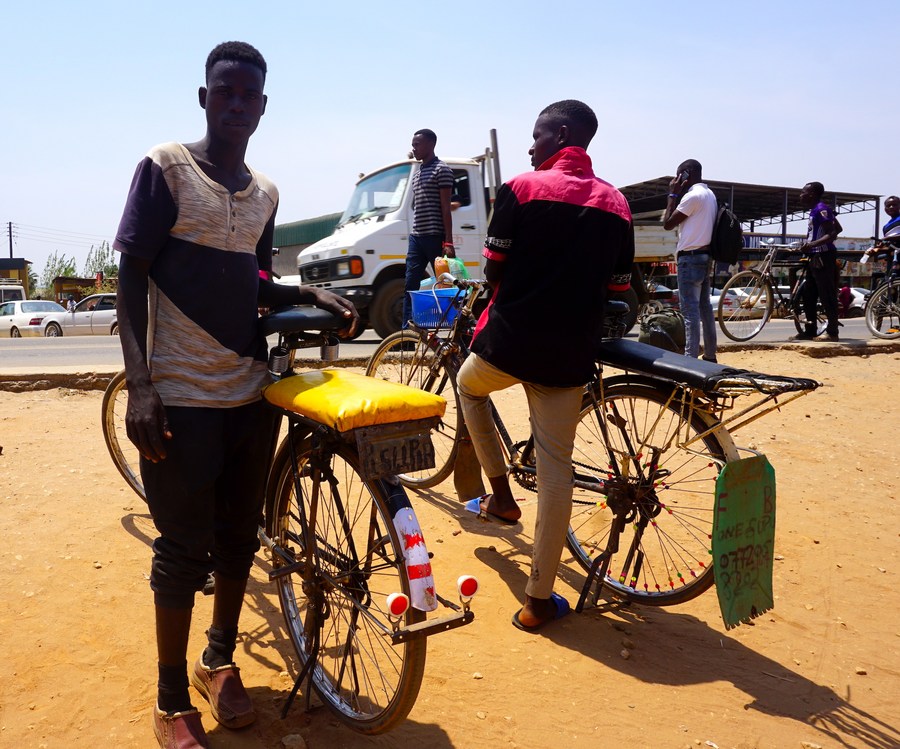
This photo shows bicycle taxi riders waiting for customers in Petauke This photo shows bicycle taxi riders waiting for customers in Petauke district, Eastern Province, Zambia, Oct. 22, 2022. (Photo by Lillian Banda/Xinhua)
This photo shows bicycle taxi riders waiting for customers in Petauke
And in remarks delivered at the launch, Minister of Finance and National Planning Situmbeko Musokotwane said the census achieved universal coverage despite some challenges faced at the start of the exercise.
“For the public sector, census information is critical, to sound decision-making in development planning, resource allocation and policy formulation,” he said, noting that the data will be particularly important in assisting the government to better allocate resources.
The data will also help the private sector in their investment planning, including service and product development, the minister said. ■

